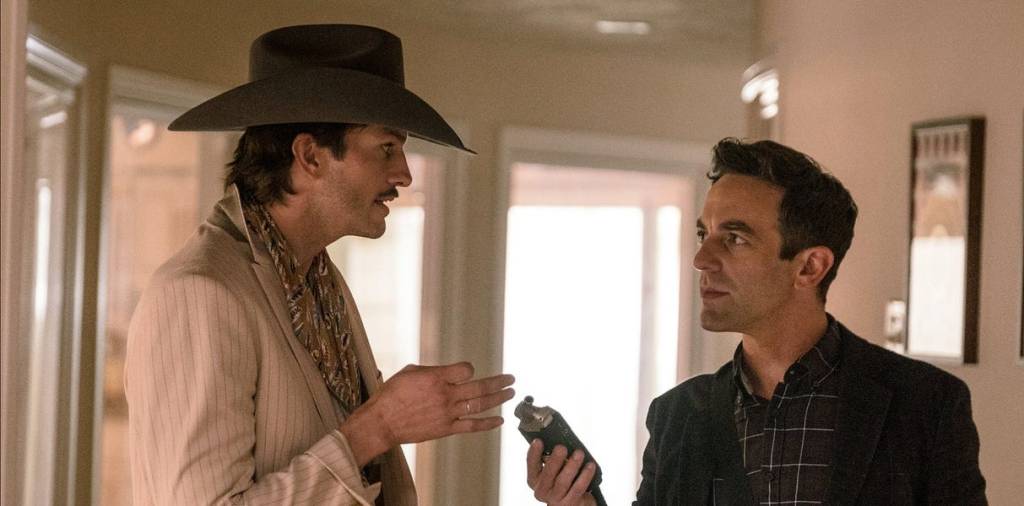B.J. Novak (of The Office notoriety) wastes no time pulling viewers into Vengeance. Taking a page from the best murder mystery storytellers’ playbook, within the first minute of the film he presents viewers with a dead body.
The following review contains some spoilers.
Novak seems unable to quite commit to a single genre: Vengeance is almost a black comedy—encased in a murder mystery. But the murder soon becomes the least interesting thing about the story, which is full of twists, turns, and quirky characters that make the hour and forty-five minutes pass by quickly. The tone of the comedy also stays closer to gray, only rarely approaching more pitch-black hues. The movie is rated R, and there are brief depictions of violence.
Novak plays the main character, Ben Manalowitz. Manalowitz is a white guy, age uncertain, in New York City. His main activities seem to be hitting the town to fatten his rolodex of women to hook up with and brainstorming podcast ideas. His gig writing for The New Yorker isn’t quite enough for him—he’s convinced that he has something big to say about America. His pitches are subsequently sweeping, about what’s really behind the tension dividing Americans from each other.
“As dorky as it sounds, I care about America, and not in that faded Lana Del Rey way,” he proclaims to a skeptical producer, Eloise (adeptly portrayed by Issa Rae.)* Stories, Eloise notes to Manalowitz, are about people, and recommends Manalowitz find something more concrete.
It is in the middle of indulging in one of his signature hobbies—I’ll leave which to your imagination—that Manalowitz gets a call from an unknown number. In a tear-choked Texas accent thick enough to cut with a knife, a man tells Manalowitz that a girl he used to hook up with—Abilene Shaw (Lio Tipton)—was found dead of an overdose in an oil field in West Texas. The teary voice belongs to Abilene’s brother, Ty (Boyd Holbrook).
The family, it becomes awkwardly clear, thinks that Manalowitz is Abilene’s boyfriend. Manalowitz, who met “Abby” while she was in New York trying to break into the music industry, is unable to clear up the misunderstanding and soon finds himself on a plane ride to Texas.
After the funeral, Ty shares with Manalowitz his conviction that there is something nefarious behind Abilene’s death: “Abilene didn’t just die—she was murdered. And the two of us are going to avenge her death,” he says.
There must be something darker going on, Ty insists, because the “girl never took so much as an Advil in her life.”
Where Ty sees a deeply layered conspiracy, Manalowitz suddenly senses an opportunity.
The death of a hook-up has suddenly become something larger: Is this a true crime story, as Ty believes, or is Abilene simply another victim to the opioid epidemic ravaging the country?
It’s podcast gold, Manalowitz tells Eloise, who signs off on the idea. Manalowitz stays in Texas to tell that big story about America he’s been envisioning—and, he promises the Shaw family—the story of who, or what, killed Abilene.
The film hits its sweet spot during Manalowitz’s efforts to chase down the story. Armed with his phone and a recorder, Manalowitz begins to capture the sights, smells, and sounds of West Texas. Culture shock ensues: public transportation is nonexistent, there is a cult-like obsession with Whataburger, and no one seems to leave their homes without packing some kind of firearm. Would you, one character poses to Manalowitz, leave the house without your phone charged?
The movie lands several genuinely hilarious moments. At one point, Manalowitz’s rental car, a Prius, is mysteriously blown up. (“What if you were driving a real car, with gas and stuff?” a distraught Ty responds.)
The casting is nearly flawless, with the supporting characters giving the movie its heart. The town’s music producing cowboy, portrayed by Ashton Kutcher, is the film’s tour de force.
If anything, the movie suffers from a degree of self-indulgence: the writing is not tight, characters are allowed to monologue, and the climax of the film delivers a bit of heroism that is hard to square with the rest of the film. Novak can’t quite seem to make up his mind when it comes in which direction to moralize. By the time the curtain drops, Manalowitz walks away a bit closer to understanding what is really important when it comes to storytelling—it’s not clear that the same was true for Novak.
*August 20, 2022: This review formerly misspelled Issa Rae’s name. We regret the error.







Please note that we at The Dispatch hold ourselves, our work, and our commenters to a higher standard than other places on the internet. We welcome comments that foster genuine debate or discussion—including comments critical of us or our work—but responses that include ad hominem attacks on fellow Dispatch members or are intended to stoke fear and anger may be moderated.
You are currently using a limited time guest pass and do not have access to commenting. Consider subscribing to join the conversation.
With your membership, you only have the ability to comment on The Morning Dispatch articles. Consider upgrading to join the conversation everywhere.